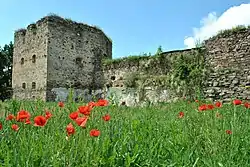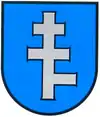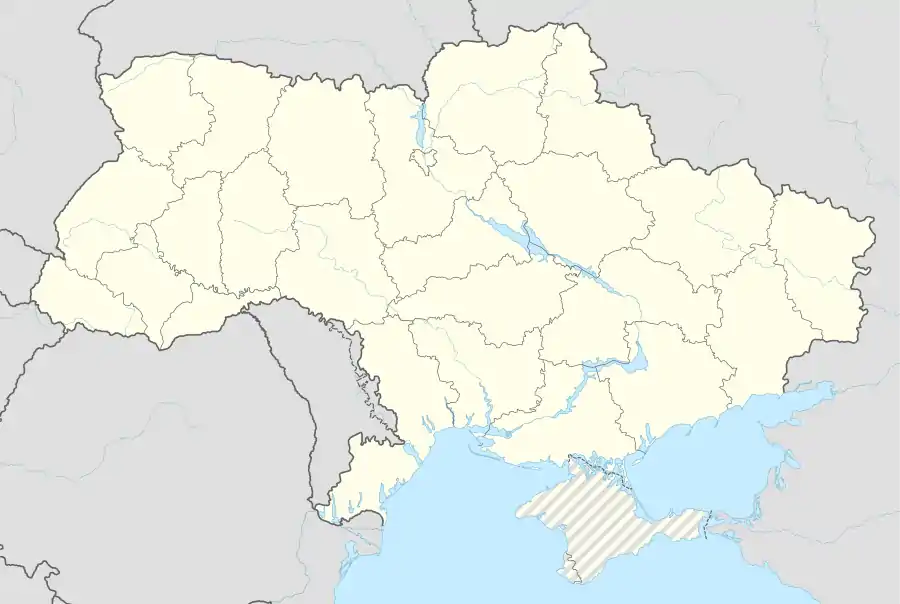Zolotyi Potik
Zolotyi Potik (Ukrainian: Золотий Потік, romanized: Zolotyy Potik; Polish: Potok Złoty or Potok; Russian: Золотой Поток, romanized: Zolotoy Potok; Yiddish: פּאָטיק, romanized: Potik; Hebrew: פוטוק זלוטי, romanized: Potok Zloti) is an urban-type settlement in the Buchach Raion (district) of Ternopil Oblast (province) in western Ukraine.[2] Population: 2,374 (2020 est.)[3]
Zolotyi Potik
Золотий Потік | |
|---|---|
 Remains of the 16th-17th century Zolotyi Potik Castle. | |
 Coat of arms | |
 Zolotyi Potik Location of Zolotyi Potik in Ukraine | |
| Coordinates: 48°54′27″N 25°20′18″E | |
| Country | |
| Province | |
| District | Buchach Raion |
| Founded | 1388 |
| Town Status | 1601, 1984 |
| Area | |
| • Total | 19.70 km2 (7.61 sq mi) |
| Elevation | 339 m (1,112 ft) |
| Population (2020) | |
| • Total | 2,374 |
| • Density | 120/km2 (310/sq mi) |
| Time zone | UTC+2 (EET) |
| • Summer (DST) | UTC+3 (EEST) |
| Postal code | 48451 |
| Area code | +380 3544 |
| Website | http://rada.gov.ua/ |
History
The settlement "Zahaipole" (Ukrainian: Загайполе, Polish: Zahajpol) was founded in 1388.[2] In 1570, it was re-established under the ownership of the House of Potocki as "Potok" (Ukrainian: Potik) - the name connected with the family's surname.[4] Potok was first mentioned in written sources in the late 16th century, as part of the territory ceded by Sigismund I the Old to Sigismund II Augustus. In 1601, it was granted Magdeburg rights and renamed "Potok Złoty" (Ukrainian: Zolotyi Potik, "Golden Brook").
When Stefan Potocki established Potok Złoty, he modified his coat of arms by changing the silver cross to gold - in this way, the Piława Potocki line evolved into two branches: silver and golden.[5] He and his wife, Maria Mohylanka, founded a church and convent of St. Stefan in the town.[6] Jakub Potocki and Stefan Potocki are both buried there.
In 1676, the invading Turkish-Tartar army destroyed the local castle. After the first partition of Poland in 1772, the town was controlled by the Holy Roman Empire (until 1804), the Austrian Empire (until 1867), Austria-Hungary (until 1919), Poland (until 1939), and finally the USSR (until 1991). In 1984, Zolotyi Potik was granted the status of an urban-type settlement.[2]
During the German occupation, its Jewish inhabitants, comprising around one-third of the total population, were mostly expelled to Buchach and then transported to the Bełżec extermination camp or shot.[7]
Landmarks and points of interest
- Ruins of the late Renaissance castle built by Stefan Potocki,[8][9]
- Church of the Holy Trinity
- Chapel of Our Mother of God of Zarvanytsia
- Belfry
- Mission cross to the 100th anniversary of the Church of Holy Trinity
- Symbolic grave of Ukrainian Sich Riflemen (restored in 1991).
References
- "Zolotyi Potik (Ternopil Oblast, Buchach Raion)". weather.in.ua. Retrieved 4 February 2012.
- "Zolotyi Potik, Ternopil Oblast, Buchach Raion". Regions of Ukraine and their Structure (in Ukrainian). Verkhovna Rada of Ukraine. Retrieved 4 February 2012.
- "Чисельність наявного населення України (Actual population of Ukraine)" (PDF) (in Ukrainian). State Statistics Service of Ukraine. Retrieved 30 September 2020.
- Krasny, Piotr (1999). "Architecture in Poland 1572-1764". In Ostrowski, Jan K. (ed.). Land of the winged horsemen : art in Poland 1572-1764. Yale University Press. p. 85.
- De Montalk, Stephanie (2001). Unquiet World: The Life of Count Geoffrey Potocki de Montalk. Victoria University Press. p. 41.
- Stolarski, Piotr (2016). Friars on the Frontier: Catholic Renewal and the Dominican Order in Southeastern Poland, 1594–1648. Routledge. pp. 82–83.
- Bartov, Omer (2010). "From Buchach to Sheikh Muwannis: Building the Future and Erasing the Past". In Rivkin-Fish, Michele R.; Trubina, Elena (eds.). Dilemmas of Diversity After the Cold War: Analyses of "cultural Difference" by U.S. and Russia-based Scholars. Woodrow Wilson Center. pp. 58–59.
- "Zolotyi Potik". Architectural and Natural Monuments of Ukraine (in Ukrainian). Retrieved 4 February 2012.
- "Zolotyi Potik". Castles and Churches of Ukraine (in Ukrainian). Retrieved 5 February 2012.
Sources
- (in Ukrainian) О. Наливайко, В. Уніят, Золотий Потік // Ternopil Encyclopedic Dictionary: in 4 v. / editorial board: H. Yavorskyi and other, Ternopil: "Zbruch", 2004, V. 1: А—Й, S. 658-659. — ISBN 966-528-197-6.